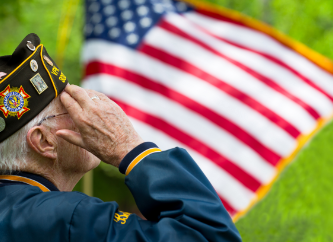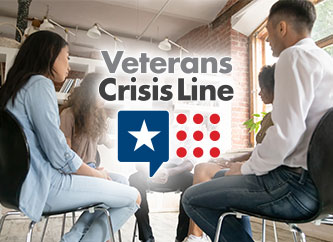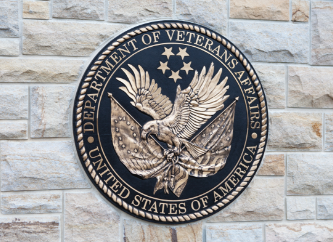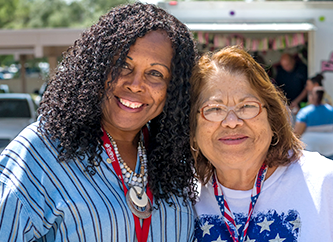Suicide Prevention Month: VA Suicide Prevention Site Offers Help Through Direct Conversation
Phoenix, AZ (September 27, 2022) – September is Suicide Prevention Month and the Department of Veterans Affairs (VA) now offers tailored support and resources through its REACH program, which calls on all of us to help prevent suicide among Veterans and all Americans.
The goal of the REACH program is to provide education and assistance to help change the way people think, talk about, and address emotional pain and suffering.
Unique Insights from Providers and Veterans
To help raise awareness of Suicide Prevention Month, TriWest Healthcare Alliance Vice President of Integrated Health Care Services, Dr. Blake Chaffee, shared his thoughts on what all Americans can do to help prevent suicide.
"One of the myths about suicide is that bringing up the topic might give someone the idea of hurting themselves when they otherwise might not think it. This is not the case," Dr. Chafee said.
Dr. Chaffee also explained that most people who consider suicide are socially isolated, and it's important to have honest conversations about suicide and ask direct questions.
Direct conversations can provide immediate insight into the thoughts and potential intentions of a Veteran or others facing personal crisis or distress.
"The best way to know if a Veteran has reached a potential crisis is to flat-out ask, 'Have you had any thoughts of hurting yourself?'" he said. "If the answer is 'yes', follow up with: 'What have you thought about doing? Do you have a plan? And if so, what have you done about it?' Someone with a plan who's begun to act on it needs immediate help," he emphasized.
Expressing concern by asking direct questions to a person facing crisis or distress can make an immediate difference in suicide prevention, according to Dr. Chafee.
One of the most helpful and important interventions in potential suicide prevention is taking the time to simply show concern and interest.
"You don't need to have all the answers," Dr. Chafee said. "Just a willingness to engage and perhaps help someone find the assistance they need," he explained.
Adrian Carlos, TriWest Training Specialist and U.S. Marine Corps Veteran, echoed Dr. Chafee's thoughts on the importance of having direct conversations with those suffering or facing personal crisis.
Through his experience working with and being a Veteran himself, he has learned that most Veterans are reluctant to share their feelings because they feel that no one understands what they're going through.
"When you join the military, no matter the branch, there's a sense of belonging," Adrian said. "You're molded into being a team and putting the mission before yourself. You have a drive that's bigger than yourself and a lot of us lose that when we leave the military," he explained.
He further described how direct and nonjudgmental conversations help draw out feelings and emotions to understand underlying issues. For many Veterans, having honest conversations with other Veterans allow them to feel a sense of connection outside of the service.
Having direct conversations, however, isn't the only step we can take to help prevent suicide.
Donny Moncrief, TriWest Manager of Behavioral Health Services and a U.S. Army Veteran, emphasizes the importance of not "pre-stigmatizing" Veterans.
"When Veterans go out into the world and into the community, a lot of people pre-stigmatize Veterans from what they collect from the news, their friends, war stories, books, anything that has been glorified or unglorified," Donny said. "Remember not to pre-stigmatize them. It could bring up some of those negative feelings," he emphasized.
Both Donny and Adrian agree that pre-stigmatization is a factor in why talking about suicide can be seen as a "taboo" subject for some. They explained how the general public may think that if they talk about suicide, they will trigger a Veteran into personal harm.
"Make no assumptions," Donny said. "Go into conversations with a blank slate and let the individual be the conversation carrier while you are the listening ear," he added.
Making personal connections with others is another factor in suicide prevention.
Dr. Chaffee noted that even though some may not know what to say to someone in crisis, on the flip side, someone in crisis may not know what help is available.
"People feel pressure to know everything to help," Dr. Chaffee said. "You don't need to have all the answers. Just a willingness to engage and perhaps help someone find the assistance they need."
Helpful Resources:
- To connect with a Veterans Crisis Line responder any time day or night, call 988 and press 1 or text 838255.
- VA's REACH website offers comprehensive information and resources to help those who are suffering. Visit the REACH website to learn more about how you can help prevent suicide by being part of the conversation, and REACH out to those in need.
TriWest also offers tools for coping and additional suicide prevention resources. Suicide is a national health issue that affects everyone. Take the time. Make the time. Be There™.













